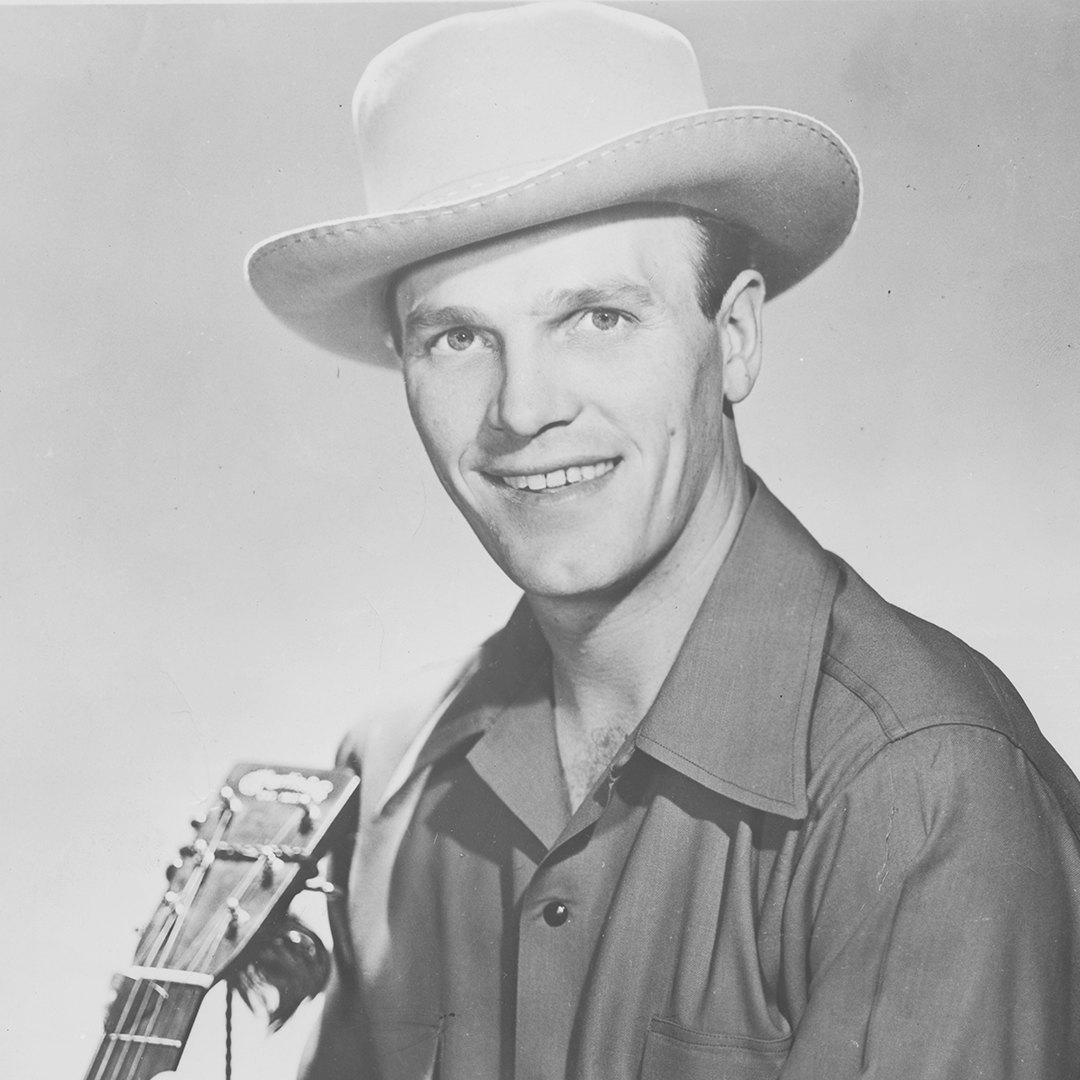Kenny
Rogers

-
Inducted2013
-
Born
August 21, 1938
-
Died
March 20, 2020
-
Birthplace
Houston, Texas
Kenny Rogers parlayed a distinctive, husky voice and laid-back sex appeal into durable, lengthy international superstardom. Between 1977 and 1987, he logged twenty #1 country hits, many of which also climbed the pop charts.
A Career Before Country Music
Kenneth Ray Rogers entered country music with a broad musical background. Growing up in public housing in Houston, he was exposed to R&B, pop, and jazz in addition to country.
Rogers’s first professional group was a late-1950s vocal act called the Scholars, which had local hits in Houston. His doo-wop recording “That Crazy Feeling,” a 1958 solo hit on Carlton Records, earned him an appearance on American Bandstand.
During the early 1960s, Rogers played bass, and occasionally sang, in a Houston jazz trio. Membership in the New Christy Minstrels folk group spurred the founding of the First Edition, in which Rogers and other former Minstrels mixed folk, rock, and country sounds. The new group went #5 pop in 1967 with Mickey Newbury’s psychedelic “Just Dropped In (to See What Condition My Condition Was In)” and gained several additional pop hits on Reprise Records.
Songs
00:00 / 00:00
00:00 / 00:00
00:00 / 00:00
Solo Stardom
After the First Edition’s breakup in 1974, producer-executive Larry Butler signed Rogers to United Artists Records, on which he had modest hits until the stunning success of the mournfully catchy, Grammy-winning “Lucille” (#1 country, #5 pop) in 1977. For the next dozen years, Rogers logged hit after hit, including “The Gambler” (1978-‘79)—penned by Don Schlitz—”She Believes in Me” (1979), and “Coward of the County” (1979-‘80).
In 1980, on Liberty Records, Rogers’s #1 country hit “Lady”—a romantic ballad written by pop star Lionel Richie—ruled the pop charts for six weeks. His successful duets included “Every Time Two Fools Collide” (1978), with Dottie West, and the crossover smash “Don’t Fall in Love with a Dreamer” (1980), with Kim Carnes.
As the country-pop era reached a peak, Rogers piled up three Grammys, five Country Music Association awards, and eight Academy of Country Music awards, adding to his stature as one of country’s first artists to sell out arena shows. Already a veteran television performer, Rogers gained further exposure through acting in TV movies, including a series of five treatments of “The Gambler,” and his hit “Love the World Away” was a theme song in the era-defining 1980 film Urban Cowboy.
As the country-pop era reached a peak, Kenny Rogers piled up three Grammys, five Country Music Association awards, and eight Academy of Country Music awards, adding to his stature as one of country’s first artists to sell out arena shows.
Videos
“Lady” with Lionel Richie
Country Music Association Awards, 1984
“The Gambler” music video
1979
Photos
-

From left: Kenny Rogers, Kim Carnes, and Valerie Harper backstage at the Forum in Los Angeles, California, 1981.
-
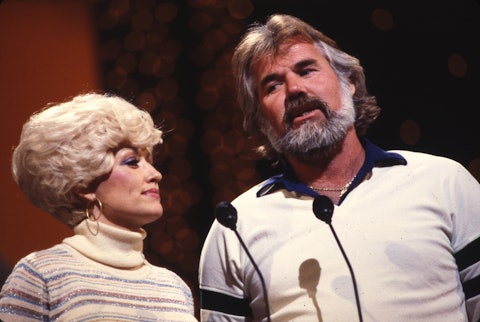
Kenny Rogers and Dolly Parton at rehearsals for the Country Music Association Awards, 1978. Photo by Steven Goldstein.
-
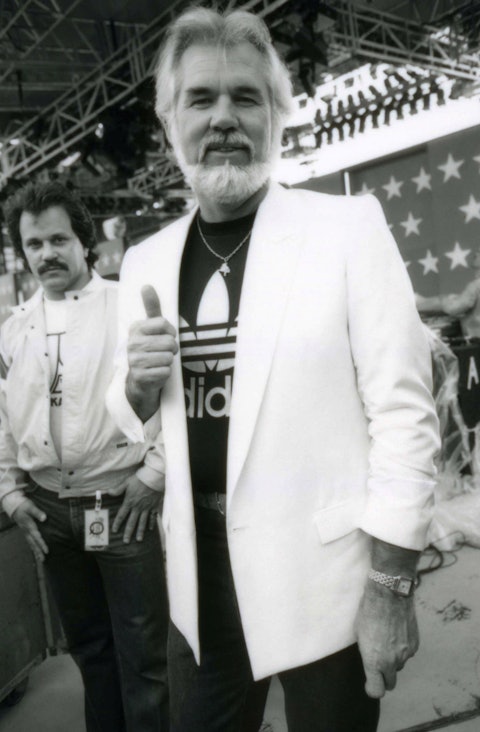
Kenny Rogers at the inaugural Farm Aid, at Memorial Stadium in Champaign, Illinois, 1985. Photo by Raeanne Rubenstein.
-
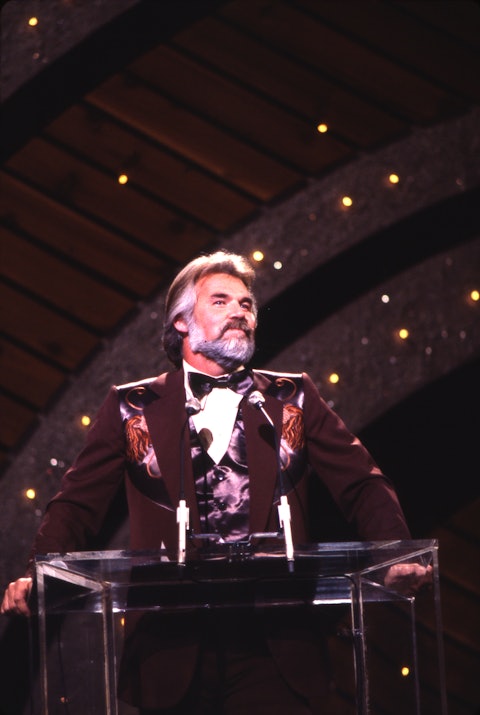
Kenny Rogers at the Country Music Association Awards, 1978. Photo by Steven Goldstein.
-
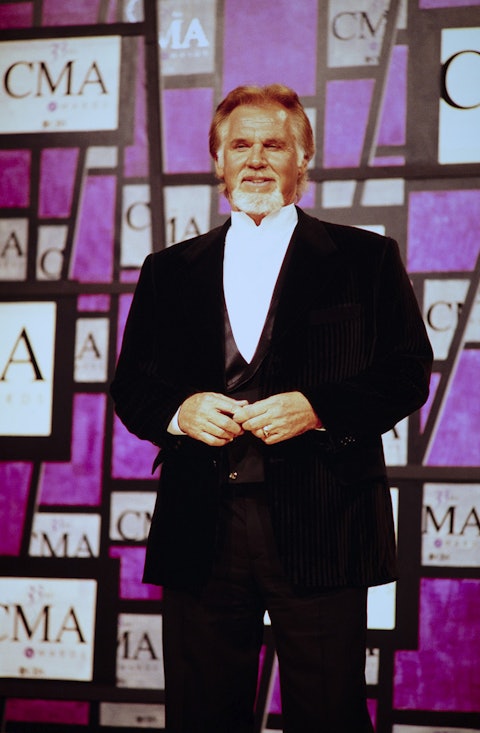
Kenny Rogers at the Country Music Association Awards, held at the Grand Ole Opry House, 1999. Photo by Raeanne Rubenstein.
-
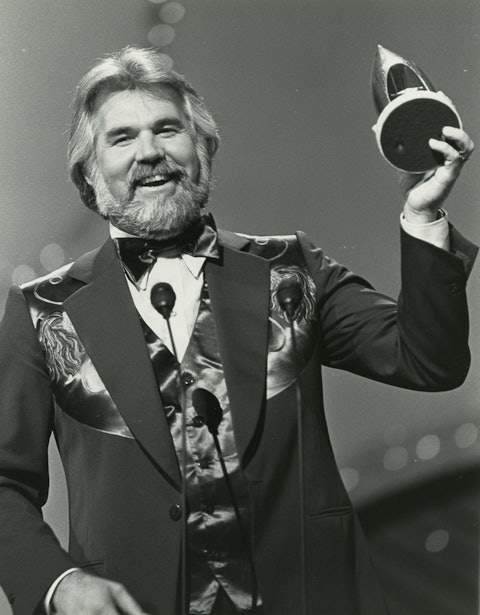
Kenny Rogers at the Country Music Association Awards, 1979. Photo by Steven Goldstein.
-
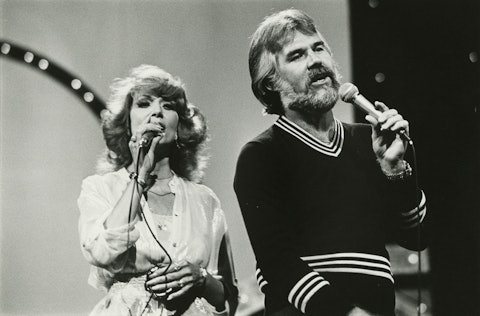
Kenny Rogers and Dottie West performing at the Country Music Association Awards, 1978.
-

Kenny Rogers (second from right) onstage with the First Edition, 1973.
-
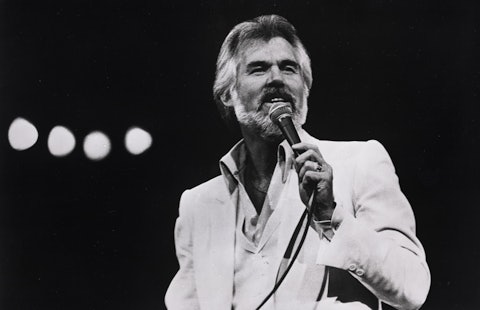
Kenny Rogers, 1980s. Photo by Walden S. Fabry Studios.
-
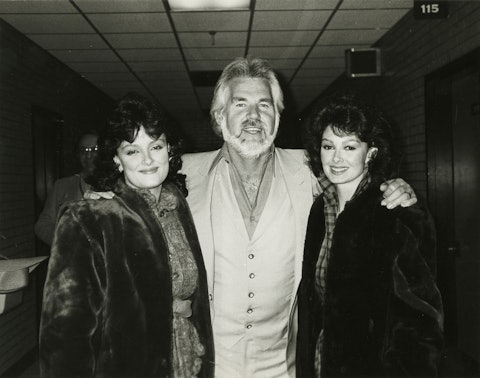
From left: Wynonna Judd, Kenny Rogers, and Naomi Judd, 1980s.
More Crossover Success
The 1980s also saw Rogers earn hits on Liberty and RCA, including “Love Will Turn You Around” (1982), the Sheena Easton duet “We’ve Got Tonight” (1983), and the memorable Dolly Parton duet “Islands in the Stream” (1983), all country #1s that made the pop charts. Rogers appeared front and center in the megastar collaboration “We Are the World” (1985), scoring additional chart-toppers such as “Crazy,” “Real Love,” and the sensual, George Martin–produced “Morning Desire.” But the solo hit “Tomb of the Unknown Love” (1986) and “Make No Mistake, She’s Mine,” a Grammy-winning duet with Ronnie Milsap released in 1987, were Rogers’s last #1 country records until “Buy Me a Rose” (1999-2000), recorded with Alison Krauss and Billy Dean.
Rogers’s crossover approach began to work against him as pop took on a harder edge and younger country artists went back to the genre’s roots. Nevertheless, he invested in Branson, Missouri, ventures, published several well-received photography books, authored two children’s books, engaged in major philanthropic endeavors, and launched a chain of restaurants.
Though his chart success slipped in the late 1980s and ‘90s through stints with Giant, Atlantic, Reprise, and Magnatone, “Buy Me a Rose” (on Dreamcatcher) gave Rogers a boost at the outset of the twenty-first century. He continued to tour and to release hits collections and albums of new material, the latter including Water & Bridges (Capitol Nashville, 2006), which yielded the Top Twenty hit “I Can’t Unlove You.”
In 2015, Rogers announced his plans to retire from the road following an extensive farewell tour. A star-studded tribute concert, featuring Linda Davis, the Oak Ridge Boys, Chris Stapleton and more, celebrated his lengthy career and impending retirement in October 2017. Rogers—who was born with the middle name Donald but legally changed it to Ray because his family used that as his middle name—died in early 2020.
— Thomas Goldsmith
Adapted from the Country Music Hall of Fame® and Museum’s Encyclopedia of Country Music, published by Oxford University Press

